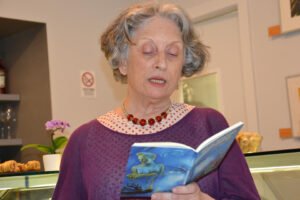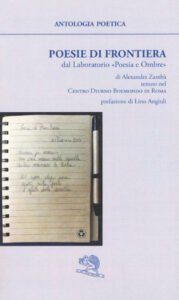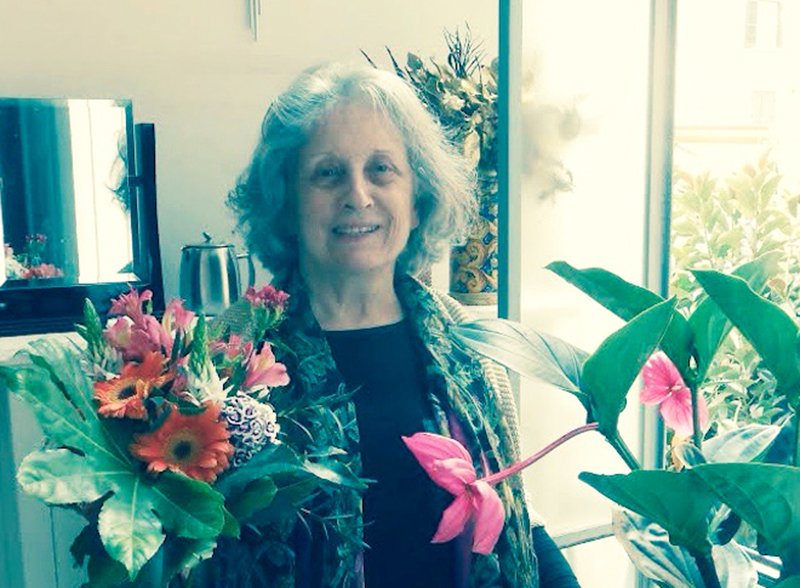In a poet, essayist, translator and theatre director THEO PANAYIDES meets an impulsive woman who best expresses herself through other people
Poet, translator, essayist, theatre director… We’ve been talking for nearly two hours – on a Zoom chat between Rome and Nicosia – yet I still don’t have a rock-solid idea what Alexandra Zamba does. “I’ve talked more about my feelings today than about the work,” she admits (in Greek) with a wry smile. Maybe I should’ve guided the conversation better. After all, she notes, she’s forever asking the vice-president of Nima (the Association of Cypriots in Italy, of which she’s president) to “keep a tight hold on the reins,” meaning rein her in when she starts to ramble: “I’m a galloping horse, and I gallop endlessly!”.
I suppose it doesn’t really matter. She says something very wise at one point, a truth often forgotten by those of us who ask other people about their lives: “As we know, life doesn’t come in big chunks. Life is made up of moments”. Her own life has some chunks we could mention – her childhood in Limassol, her 50-year marriage to film director Pasquale Misuraca – but it’s mostly moments. We could Zoom for six more hours and still collect no more than a handful.
Professionally speaking she’s edited poetry collections, written and staged plays, worked in literary translation, weighed in on subjects as varied as “the curative value of Nature on mental disorders” and the relationship between language and mass migration. She’s founded TV production companies, and runs the department of international children’s literature at a publishing house in Italy. She’s led a workshop at a mental-health centre (more on this later) and made a documentary with well-known director Yannis Economides in 1995, following puppeteer Giorgos Idalias – a beloved character from her native Limassol – on a trip along the Green Line. These are all moments, in their way, distinct adventures linked by her galloping energy.
Her creative process is impulsive, her way of working fast and fragmentary. Once she has her teeth in a project she’ll work very long hours, burning the midnight oil: “There are no set hours. If I get sleepy, I’ll have a coffee”. Throughout her 73 years (and counting) she’s never needed more than four hours sleep, says Alexandra, though one of her daughters – who’s a doctor – makes her take a pill nowadays, to bump up her slumber to about six hours. “The strange thing,” she recalls of her younger days, when she sometimes only slept for a couple of hours, “is that when I woke up I was full of energy. I never felt like I needed more sleep.”

Dialogue was the one thing lacking in her childhood home, recalls Alexandra, steepling her fingers and gazing at the camera down her fine, aquiline nose (I believe they call it a ‘Roman nose’, a happy coincidence for someone who’s lived in that city since studying at La Sapienza in the 1960s). Her dad was a card-carrying Commie working for BBC Radio, as well as a very handsome man: the surname Zambas (from ‘zamba’, or ‘leg’) was actually a nickname, bestowed on his family because of their fine long legs. Her mum was Greek-Egyptian aristocracy, Alexandria-born – Alexandra was also born in that city, moving to Cyprus as a baby – and the granddaughter of a big tobacco merchant driven out of Imbros by the Turks. Mum stood out among the provincial, headscarf-wearing Cypriot women of the day, and not just because she spoke ‘proper’ Greek. “My mother wore makeup. My mother smoked. She had her hair done, she was beautiful and liked looking beautiful. She expressed herself with her body, which the Cypriot women didn’t.”
She admired her mother as a child, she says – but may also have been overwhelmed. Alexandra was shy in those days, “I’d hide my feelings. I only opened up when I came to Italy”. (It was to her father – “a good listener” – that she confided her childhood problems.) The dialogue between the parents was erratic; one gets a sense that they loved each other but weren’t entirely compatible, the well-born coquette and the BBC techie. Mum would always speak French when she wanted to annoy Dad, knowing he didn’t speak a word of it; when it came to deciding where their daughter would go and study, Mum vetoed the USSR (which was Dad’s choice) and Dad rejected Greece (which was Mum’s), leaving Italy as a rather haphazard compromise. Alexandra herself didn’t particularly care, she recalls: “I just wanted my freedom,” to get out of Cyprus, and – since she wasn’t planning to marry and live off her husband – to be independent.
She studied Economics, purely to help her get a job afterwards – though in fact her first job was as a high-school teacher, and there seems to be a great deal of the teacher in her personality. Despite all that creative energy, it may well be that Alexandra Zamba’s biggest talent isn’t as an artist but an enabler, a facilitator – editing, translating, inspiring the troubled schizophrenics and other patients in that mental-health centre, ‘expressing herself through other people’.

The reason why she didn’t have more kids is the “great sorrow” of her life, a tragedy that makes her voice waver and her face crumple just to talk about it. Alexandra had a son in addition to her two daughters, a boy who was diagnosed with leukaemia at three years old, seemed to recover, grew into “a wonderful young man,” she sighs – then suffered a relapse and passed away, at the age of 17. “So…” she says, looking across our online chasm with an air of devastation – and of course I change the subject, though I also can’t help wondering how her son’s death may have channelled her creative life. “Shakespeare says, ‘Give words to your sorrow so your heart won’t break’,” she confirms, as if reading my thoughts (the relevant quote comes from Macbeth). “I had to give words, so my heart wouldn’t break.”
The words weren’t always her own, nor did they have to be; it may actually have been more therapeutic to facilitate others. She has another Zoom chat lined up in a few hours, she tells me (Rome is locked down, of course; Alexandra hasn’t left the house in months), to discuss a new book she’s translated called Stories of Sirens and Mermaids, and she also recently curated a collection of poems by 37 young Cypriot poets, to be published in Cyprus by Armida Books. Armida also published, in 2018, the Greek version of Poesie di Frontiera – the book she wrote, or more properly co-wrote, with the patients at the aforementioned mental-health centre.
That, you might say, was the ultimate instance of ‘dialogue’ – not just conversation but dialogue in a Socratic sense, talking through a situation to arrive at some productive conclusion (only poetic rather than philosophical). Alexandra describes the process: she’d come in, greet the group – sometimes as many as 40 people – and raise a subject, ‘cats’ for instance. One man, she recalls (actually a man with quite severe psychological issues), responded that he liked cats very much, and used to feed the neighbourhood cats every day. She asked for details; poetry, after all, lives in the details. The man described how he’d open an iron gate with a key every day, the clink of metal on metal being the signal for the cats to gather. Was there traffic on the road? Was it noisy? “Then we started to ask: ‘What is silence?’,” recalls Alexandra, the silence of sadness and inner worlds – and so, bit by bit, a poem was born. “It’s an exploration. An understanding. A mutual relationship of past and present,” she adds, touching on the way her own past may have fed into the process.
Poetry lives in details – and details, after all, are also moments, life is made up of fragments. Alexandra says another wise (or just poetic) thing later, on the subject of friends. A person with her galloping energy is often flighty, impatient, maybe fickle – but she’s unusually loyal, she insists, not just to her husband but also to her friendships. “I feel that friends hold a part of myself that I don’t know,” she explains; “So, if I lose my friend, I lose myself”. She’ll meet childhood friends when she comes back to Cyprus – and they’ll sometimes mention things she said or did decades ago, things she herself doesn’t even remember. It’s a beautiful thought – that we all scatter fragments of ourselves on the people we meet in life, and can only reconnect with those past selves by remaining friends with them.
“We’re not exactly what we think we are,” she points out. “We have all these scattered pieces we don’t even know about. That’s why writing is a night-time activity,” she adds unexpectedly, “it happens at night.” (Does it? That’s news to me.) “The night conceals everything around us, it takes away even the present – and so bits of us come to the surface, a self we didn’t know about. That’s why writers often say, ‘I started writing something, and ended up with something else entirely’.” Her own writing, I assume, happens at night, those fugitive hours and long, sleepless nights where she just keeps going, sustained by coffee and her own creativity.
Alexandra seems to work on instinct and energy. “I need trust,” she says, because she seldom knows where a project is going; her actors have to trust her, and trust that something good will come of it. “There’s an inner lava that defines me, that guides me.” A lava? “Yes, because I’m always bubbling away” – and I sense it even in a Zoom chat, that sense of ferment and smoulder. “Sometimes I erupt, and it can be awkward. Often, when I speak, I’d have done better not to speak – but it’s an eruption, I can’t help it!” That too, I suppose, is a kind of dialogue.
Two hours later, and I’m not entirely sure what she does – or how she decides what to do, whether to write an essay or translate a book or stage a play. (She’s impressively prolific; she’s staged a production every year since 2008, except 2018 and pandemic-ridden 2020.) That’s okay, though, since she doesn’t really seem to know herself. Ideas come, propelling her on this or that path; “I don’t resist. I follow”.
She comes off as an odd combination of something very definite – all that tireless doing plus a certain patrician self-possession; there’s a bit of the grande dame about her – and something very open, willing to follow any notion and fly by the seat of her pants. “I like life,” shrugs Alexandra. “Whatever I do, I like it. If I’m dusting my bookshelf, for instance, I like to dust. If I start doing the dishes, I like doing the dishes.” Dialogue, I guess, is a bit like that too – a yielding, a compromise, letting go of your own definition and following the back-and-forth where it leads. You have to be open – and of course you have to keep going. A galloping horse, galloping endlessly.







Click here to change your cookie preferences